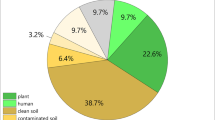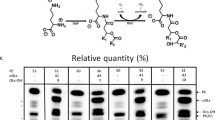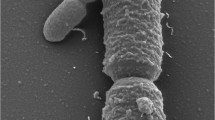Abstract
Methanol-utilizing metabolism is generally found in methylotrophic yeasts. Several potential promoters regulating enzymes in this pathway have been extensively studied, especially alcohol oxidase. Here, we characterized the alcohol oxidase gene promoter from thermotolerant Ogataea thermomethanolica (OthAOX). This promoter can be induced by methanol, and was shown to regulate expression of phytase up to 45 °C. The pattern of heterologous phytase N-glycosylation depends on the induction temperature. Unlike the AOX promoter from Pichia pastoris, this OthAOX initially turns on the expression of the heterologous protein at the de-repression stage in the presence of glycerol. Full induction of protein is observed when methanol is present. With this methanol-inducible promoter, target protein can be initially produced prior to the induction phase, which would help shorten the time for protein production. Being able to drive protein expression at various temperatures prompts this newly identified AOX promoter to be potential tool for heterologous protein production in high temperature conditions.



Similar content being viewed by others
References
Limtong S, Srisuk N, Yongmanitchai W, Yurimoto H, Nakase T (2008) Ogataea chonburiensis sp. nov. and Ogataea nakhonphanomensis sp. nov., thermotolerant, methylotrophic yeast species isolated in Thailand, and transfer of Pichia siamensis and Pichia thermomethanolica to the genus Ogataea. Int J Syst Evol Microbiol 58:302–307
Macauley-Patrick S, Fazenda ML, McNeil B, Harvey LM (2005) Heterologous protein production using the Pichia pastoris expression system. Yeast 22:249–270
Yurimoto H, Oku M, Sakai Y (2011) Yeast methylotrophy: metabolism, gene regulation and peroxisome homeostasis. Int J Microbiol dor. doi:10.1155/2011/101298
Cregg JM, Madden KR, Barringer KJ, Thill GP, Stillman CA (1989) Functional characterization of the two alcohol oxidase genes from the yeast Pichia pastoris. Mol Cell Biol 9(3):1316–1323
Hartner FS, Glieder A (2006) Regulation of methanol utilisation pathway genes in yeasts. Microb Cell Fact 5:39
Inan M, Meagher MM (2001) Non-repressing carbon sources for alcohol oxidase (AOXI) promoter of Pichia pastoris. J Biosci Bioeng 92:585–589
Gellissen G, Melber K, Janowicz ZA, Dahlems UM, Weydemann U, Piontek M, Strasser AW, Hollenberg CP (1992) Heterologous protein production in yeast. Antonie Van Leeuwenhoek 62(1–2):79–93
Limtong S, Srisuk N, Yongmanitchai W, Yurimoto H, Nakase T, Kato N (2005) Pichia thermomethanolica sp. nov., a novel thermotolerant, methylotrophic yeast isolated in Thailand. Int J Syst Evol Microbiol 55:2225–2229
Tanapongpipat S, Promdonkoy P, Watanabe T, Tirasophon W, Roongsawang N, Chiba Y, Eurwilaichitr L (2012) Heterologous protein expression in Pichia thermomethanolica BCC16875, a thermotolerant methylotrophic yeast and characterization of N-linked glycosylation in secreted protein. FEMS Microbiol Lett 334:127–134
Harnpicharnchai P, Promdonkoy P, Sae-Tang K, Roongsawang N, Tanapongpipat S (2013) Utilization of glyceraldehyde-3-phosphate dehydrogenase promoter of a thermotolerant yeast, Pichia thermomethanolica, for heterologous gene expression especially at elevated temperature. Ann Microbiol. doi: 10.1007/s13213-013-0765-z
Promdonkoy P, Tang K, Sornlake W, Harnpicharnchai P, Kobayashi RS, Ruanglek V, Upathanpreecha T, Vesaratchavest M, Eurwilaichitrl L, Tanapongpipat S (2009) Expression and characterization of Aspergillus thermostable phytases in Pichia pastoris. FEMS Microbiol Lett 290:18–24
Faber K (1993) Highly-efficient electrotransformation of the yeast Hansenula polymorpha. Curr Genet 25:305–310
Yamada Y, Maeda K, Mikata K (1994) The phylogenetic relationships of the hat-shaped ascospore-forming, nitrate-assimilating Pichia species, formerly classified in the genus Hansenula Sydow et Sydow, based on the partial sequences of 18S and 26S ribosomal RNAs (Saccharomycetaceae): the proposals of three new genera, Ogataea, Kuraishia, and Nakazawaea. Biosci Biotechnol Biochem 58:1245–1257
Yamada Y, Matsuda M, Maeda K, Mikata K (1995) The phylogenetic relationships of methanol-assimilating yeasts based on the partial sequences of 18S and 26S ribosomal RNAs: the proposal of Komagataella gen. nov. (Saccharomycetaceae). Biosci Biotechnol Biochem 59(3):439–444
Kranthi BV, Kumar R, Kumar NV, Rao DN, Rangarajan PN (2009) Identification of key DNA elements involved in promoter recognition by Mxr1p, a master regulator of methanol utilization pathway in Pichia pastoris. Biochim Biophys Acta 1789:460–468
Van Zutphen T, Baerends RJS, Susanna KA, de Jong A, Kuipers OP, Veenhuis M, der Klei IJV (2010) Adaptation of Hansenula polymorpha to methanol: a transcriptome analysis. BMC Genom 11:1
Lin-Cereghino GP, Godfrey L, de la Cruz BJ, Johnson S, Khuongsathiene S, Tolstorukov I, Yan M, Lin-Cereghino J, Veenhuis M, Subramani S, Cregg JM (2006) Mxr1p, a key regulator of the methanol utilization pathway and peroxisomal genes in Pichia pastoris. Mol Cell Biol 26(3):883–897
Pereira GG, Hollenberg CP (1996) Conserved regulation of the Hansenula polymorpha MOX promoter in Saccharomyces cerevisiae reveals insights in the transcriptional activation by Adr1p. Eur J Biochem 238:181–191
Gödecke S, Eckart M, Janowicz ZA, Hollenberg CP (1994) Identification of sequences responsible for transcriptional regulation of the strongly expressed methanol oxidase-encoding gene in Hansenula polymorpha. Gene 139:35–42
Yurimoto H, Sakai Y (2009) Methanol-inducible gene expression and heterologous protein production in the methylotrophic yeast Candida boidinii. Biotechnol Appl Biochem 53:85–92
Cabeca-Silva C, Madeira-Lopes A (1984) Temperature relations of yield, growth and thermal death in the yeast Hansenula polymorpha. Z Allg Mikrobiol 24:129–132
Acknowledgments
We are grateful to Dr Philip J. Shaw, for critically editing the manuscript. Financial support (P-09-00108) from the National Center for Genetic Engineering and Biotechnology, National Science and Technology Development Agency, Thailand is greatly appreciated.
Author information
Authors and Affiliations
Corresponding author
Rights and permissions
About this article
Cite this article
Promdonkoy, P., Tirasophon, W., Roongsawang, N. et al. Methanol-Inducible Promoter of Thermotolerant Methylotrophic Yeast Ogataea thermomethanolica BCC16875 Potential for Production of Heterologous Protein at High Temperatures. Curr Microbiol 69, 143–148 (2014). https://doi.org/10.1007/s00284-014-0568-x
Received:
Accepted:
Published:
Issue Date:
DOI: https://doi.org/10.1007/s00284-014-0568-x




